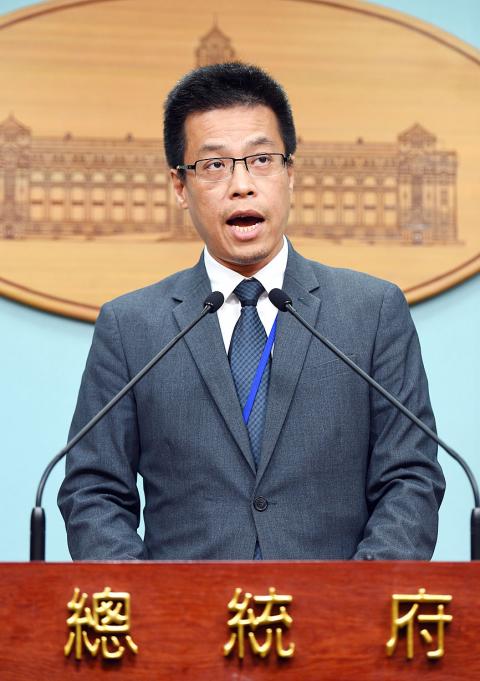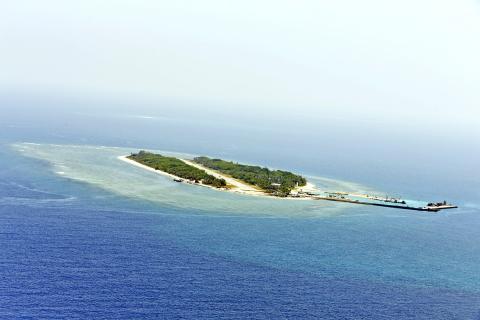Taiwan yesterday refused to accept a ruling by the Permanent Court of Arbitration in The Hague, Netherlands,which included a statement that Taiwan-controlled Itu Aba Island (Taiping Island, 太平島) in the Spratly Islands (Nansha Islands, 南沙群島) is a “rock,” saying the verdict has severely infringed on Taiwan’s rights over the South China Sea island and its surrounding waters.
In the case brought by the Philippines against China over their disputes in the South China Sea, the Philippines argued that land formations claimed by Beijing in the South China Sea are not islands and therefore not entitled to 200 nautical mile (370.4km) exclusive economic zones.
While Taiwan was not party to the case, its claims in the South China Sea are similar to those of China and Itu Aba Island was brought up in testimony during the court hearings.

Photo: Chang Chia-ming, Taipei Times
The international tribunal yesterday concluded that all of the high-tide features in the Spratly Islands, including Itu Aba, are legally “rocks” that do not generate an exclusive economic zone or continental shelf.
“We hereby stress that the Republic of China [ROC] enjoys rights as afforded by international law and the UN Convention on the Law of the Sea over South China Sea islands and their relevant waters,” Presidential Office spokesman Alex Huang (黃重諺) told a news conference following the issuance of the verdict yesterday afternoon.
Huang said that as Taipei was not invited to participate in the arbitration process, nor consulted on its opinion, the government solemnly declares its refusal to recognize the tribunal’s verdict and deems it as carrying no legal effect on the nation.

Photo: EPA
Reiterating the nation’s sovereignty claims over South China Sea islands and their surrounding waters, Huang said the government pledges to steadfastly safeguard the nation’s territory and sovereignty, and would prevent any infringement of its national interests.
“We call for a peaceful resolution of disputes in the South China Sea through multilateral negotiations,” he added.
Shortly after the ruling was issued, President Tsai Ing-wen (蔡英文) convened a high-level government meeting, Huang said, adding that the government has decided to move forward by one day a patrol mission to the South China Sea by a Kang Ding-class frigate originally scheduled for tomorrow.
Minister of Foreign Affairs David Lee (李大維) made an intriguing statement at a news conference at the ministry at 8pm yesterday, saying that while the international tribunal’s categorization of Itu Aba as a “rock” was the worst-case scenario for the government, Tsai would “take action” today.
Asked whether Tsai plans to board the frigate leaving for the South China Sea, Lee said: “I can say no more.”
Reacting to the ruling, Chinese Nationalist Party (KMT) Culture and Communications Committee director Chow Chi-wai (周志偉) said that it was utterly unacceptable and unsatisfactory.
Chow added that the “U-shaped line” representing the nation’s territory in the region covers a total sea area of 3.6 million square kilometers, which is more than 100 times the size of Taiwan.
“We must not relinquish our nation’s strategic interests,” Chow said, urging Tsai to clearly declare the nation’s stance and safeguard its interests.
The line — also known as the “11-dash line” — was featured in the “Location Map of the South China Sea Islands” drawn up by the ROC government in 1947. After the KMT lost the Chinese Civil War and fled to Taiwan, the Chinese Communist Party changed it to a “nine-dash line.”
Saying there is potable water and people living on Itu Aba, KMT caucus secretary-general Lin Te-fu (林德福) urged Tsai to visit the island to formally declare the nation’s sovereignty and show to the world that it is an island.
KMT Legislator Johnny Chiang (江啟臣) said Taiwan is probably “the greatest loser” in the arbitration.
“[China] has fists and countries in the South China Sea will now have an international ruling — even though the ruling is not legally binding — and the US to back their claims, but Taiwan’s island has become a rock overnight,” Chiang said.
KMT Legislator Lai Shyh-bao (賴士葆) advised the government to take “hardline measures,” such as “sending out warships immediately to the area to protect the nation’s territory.”
Former president Ma Ying-jeou (馬英九), who on January 28 visited Taiping Island in an effort to reject the Philippines’ categorization of it as a "rock" and prove to the international community that the island can sustain human habitation and economic life, posted a message on Facebook late yesterday, saying that as are all Taiwanese people, he is extremely astonished and enraged by the ruling.
The People First Party also issued a statement dismissing the ruling, saying the government must refuse to recognize any verdicts or announcements regarding South China Sea islands handed down by international courts based on “hypocritical reasons” or technicalities.
Meanwhile, the American Institute in Taiwan, reiterating its long-standing policy, said the US supports the peaceful resolution of disputes in the South China Sea, including the use of international legal mechanisms such as arbitration.
Additional reporting by Alison Hsiao

NATIONAL SECURITY THREAT: An official said that Guan Guan’s comments had gone beyond the threshold of free speech, as she advocated for the destruction of the ROC China-born media influencer Guan Guan’s (關關) residency permit has been revoked for repeatedly posting pro-China content that threatens national security, the National Immigration Agency said yesterday. Guan Guan has said many controversial things in her videos posted to Douyin (抖音), including “the red flag will soon be painted all over Taiwan” and “Taiwan is an inseparable part of China,” while expressing hope for expedited “reunification.” The agency received multiple reports alleging that Guan Guan had advocated for armed reunification last year. After investigating, the agency last month issued a notice requiring her to appear and account for her actions. Guan Guan appeared as required,

DAREDEVIL: Honnold said it had always been a dream of his to climb Taipei 101, while a Netflix producer said the skyscraper was ‘a real icon of this country’ US climber Alex Honnold yesterday took on Taiwan’s tallest building, becoming the first person to scale Taipei 101 without a rope, harness or safety net. Hundreds of spectators gathered at the base of the 101-story skyscraper to watch Honnold, 40, embark on his daredevil feat, which was also broadcast live on Netflix. Dressed in a red T-shirt and yellow custom-made climbing shoes, Honnold swiftly moved up the southeast face of the glass and steel building. At one point, he stepped onto a platform midway up to wave down at fans and onlookers who were taking photos. People watching from inside

A Vietnamese migrant worker yesterday won NT$12 million (US$379,627) on a Lunar New Year scratch card in Kaohsiung as part of Taiwan Lottery Co’s (台灣彩券) “NT$12 Million Grand Fortune” (1200萬大吉利) game. The man was the first top-prize winner of the new game launched on Jan. 6 to mark the Lunar New Year. Three Vietnamese migrant workers visited a Taiwan Lottery shop on Xinyue Street in Kaohsiung’s Gangshan District (崗山), a store representative said. The player bought multiple tickets and, after winning nothing, held the final lottery ticket in one hand and rubbed the store’s statue of the Maitreya Buddha’s belly with the other,

‘NATO-PLUS’: ‘Our strategic partners in the Indo-Pacific are facing increasing aggression by the Chinese Communist Party,’ US Representative Rob Wittman said The US House of Representatives on Monday released its version of the Consolidated Appropriations Act, which includes US$1.15 billion to support security cooperation with Taiwan. The omnibus act, covering US$1.2 trillion of spending, allocates US$1 billion for the Taiwan Security Cooperation Initiative, as well as US$150 million for the replacement of defense articles and reimbursement of defense services provided to Taiwan. The fund allocations were based on the US National Defense Authorization Act for fiscal 2026 that was passed by the US Congress last month and authorized up to US$1 billion to the US Defense Security Cooperation Agency in support of the